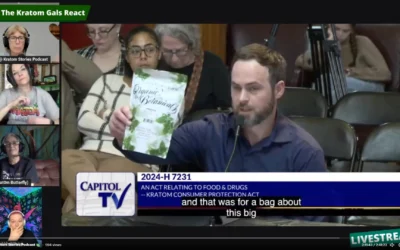Kratom Import Alerts
During a recent discussion in Washington D.C. with President Joe Biden, the Indonesian president Joko Widodo requested the administration to revoke a Food and Drug Administration (FDA) warning that generally limits kratom imports into the U.S., as reported by two advocacy organizations.
Indonesia is a leading global supplier of kratom, a Southeast Asian plant utilized for numerous uses. The plant is presently not classified under U.S. legislation, but an import warning issued by the FDA has significantly curtailed kratom imports from Indonesia.
On Monday, Indonesian President Joko Widodo had a bilateral discussion with President Biden at the White House. The American Kratom Association (AKA) and the Global Kratom Coalition reported that Widodo took this chance to ask for administrative measures to lift the FDA Kratom Import Alert, highlighting the economic and environmental impacts of the existing kratom import policy on Indonesia.
When Marijuana Movement sought a comment, the White House directed the request to the National Security Council (NSC). An NSC representative stated they have “no further information to provide on the Leaders’ discussion apart from the joint statement and fact sheet released on Monday,” which do not specifically refer to kratom.
The gathering takes place roughly two months following a letter sent by Moeldoko, Widodo’s chief of staff, to an FDA official in charge of import operations. The letter expressed that the limitation has severely affected Indonesian kratom farmers. Furthermore, it made a promise of unwavering dedication to working together with the FDA to ensure the safety and excellence of kratom products imported into the United States.
A week prior to the meeting at the White House with the Indonesian president, the governor of West Kalimantan province in Indonesia sent a distinct letter to Biden. The letter contended that the FDA’s import alert has “adversely impacted the over 250,000 kratom farmers and their families who lack any other viable means of earning a living.”
Furthermore, this Import Alert presents a severe threat to the climate due to its potential to cause the deforestation of over 21 million kratom trees in the ecologically sensitive Borneo rainforest, as stated in the letter, according to excerpts included in the American Kratom Associations press release.
The potential environmental disaster is due to Indonesian farmers’ claim that the most feasible substitute for kratom would be to repurpose land for palm oil production, which would necessitate extensive deforestation in the Borneo rainforest area.
Ban On Kratom
Former Representative Matt Salmon (R-AZ), who is the board chair of AKA, stated in a press release on Tuesday that “the FDA has inappropriately exploited its import alert power to effectively impose a ban on kratom in the United States because the Agency cannot provide the necessary evidence and data to justify domestic scheduling of kratom.”
He said that if this import alert continues, it will have terrible effects on the economy and the environment.
The alert doesn’t completely prohibit the importation of kratom into the U.S., but it introduces new limitations that allow for the detention and examination of such products, potentially blocking or significantly delaying their entry.
Salmon said that the kratom import alert contradicts the Biden Administration’s goals. These goals include strengthening trade relations with Indonesia and countering China’s efforts in the South Pacific. Additionally, the administration aims to promote strong climate policies.
He said the FDA’s kratom import alert is reversing the progress made by the Biden Administration’s foreign policy in this area. This alert is undoing the progress made by the Biden Administration’s foreign policy in this area.
“The FDA’s decision to impose an import alert on kratom exported from Indonesia is an inexplicable foreign policy error that significantly undermines U.S. foreign policy objectives related to climate change initiatives,” said the former congressman. “This plant supports the livelihood of over 250,000 impoverished farmers and their families in the Borneo rainforest region. Worse still, the import alert on kratom disregards any impact other than furthering the FDA’s self-appointed mission against a botanical supplement it disapproves of.”
In addition, a newly formed advocacy group, the Global Kratom Coalition, has joined the call to end the FDA’s restriction. They highlighted that 97 percent of kratom imported into the U.S. originates from Indonesia.
“The FDA’s warning could severely damage Indonesian farmers who depend on kratom cultivation for their income,” stated Matthew Lowe, the coalition’s executive director, in a press statement. “It will also affect American consumers who use kratom to alleviate anxiety, control pain, and manage opioid withdrawal symptoms.”
“Considering these factors and the possible repercussions for cultivators and their surroundings, we hope the administration heeds President Widodo’s plea and overturns this decision,” he added. “Establishing a set of federal rules to regulate the industry would be a more sensible and beneficial strategy.”
In its alert from July, the FDA stated that it has “observed a surge in the number of shipments of dietary supplements and bulk dietary ingredients that are, or include kratom,” and “there seems to be no history of usage or other safety evidence indicating that kratom can be reasonably expected to be safe as a dietary ingredient.”
The FDA has previously tried to impose a domestic ban on kratom by suggesting its classification under the Controlled Substances Act (CSA), but this initiative did not progress. In 2021, the agency sought public feedback as it planned to present the U.S. viewpoint on a potential global kratom ban that ultimately did not come to fruition.
Earlier this year, a former drug czar Jim Carroll from the Trump administration revealed that several high-ranking federal officials had stepped in to stop the FDA from acting on its “prejudice” and prohibiting kratom in the U.S.
Critics argue that the FDA has misrepresented information about kratom, exaggerating its health dangers. They point out that the FDA failed to differentiate between the health risks of kratom itself and those posed by contaminants in unregulated kratom products.
In related news, federal legislators have recently proposed a bill that would oversee kratom products nationwide, echoing a similar initiative from the previous legislative session. The bill, now known as the Kratom Consumer Protection Act, is anticipated to receive cross-party backing in both houses.
NIH & NIDA Kratom
Rep. Mark Pocan (D-WI), the primary sponsor of the bill in the House, has been a vocal advocate for research into kratom, highlighting its potential therapeutic benefits.
During a congressional hearing last year, for instance, he expressed gratitude to the National Institute on Drug Abuse (NIDA) for funding studies on the plant, asserting that kratom has “assisted many individuals in quitting opioids.”
Last year, the National Institutes on Health (NIH) held a conference to investigate the therapeutic possibilities of the “disputed tree,” with a specialist giving a comprehensive review of kratom’s science and its potential role in alleviating the overdose crisis.
Globally, the United Nations World Health Organization (WHO) in 2021 chose not to advocate for a worldwide ban on kratom, marking a win for campaigners.
We grounded the decision on a scientific evaluation of kratom’s dependency risk, potential for misuse, and therapeutic uses. However, supporters highlighted that approximately 80,000 individuals provided feedback to the panel, expressing their viewpoints and experiences with the plant-based substance.
Conclusion
Kratom is used by millions of individuals across the United States. It’s crucial that we consider appropriate regulation and reassure customers that the kratom products they are buying have undergone assessment and testing for purity and potency!






0 Comments